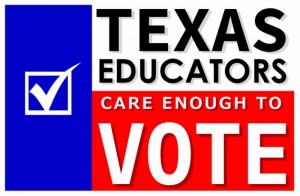Sen. Bettencourt leads attack on educators voting

Elections
Date Posted: 12/14/2017 | Author: Mark Wiggins
State Sen. Paul Bettencourt (R-Houston) has fired the first public shot in what has been a heretofore behind-the-scenes effort to discourage educators from voting en masse in the upcoming elections.
On Wednesday, Sen. Bettencourt submitted a request for a legal opinion from Texas Attorney General Ken Paxton regarding school districts that are actively promoting a culture of voting. In his request, Sen. Bettencourt raises grave concern over the prospect of school districts encouraging teachers, students, and staff to exercise their civic right and responsibility to vote.
 In his letter, Sen. Bettencourt draws attention to the Educator’s Oath to Vote championed by the nonpartisan Texas Educators Vote coalition, of which ATPE is a member. The oath is a means for Texas educators to demonstrate their commitment to voting in 2018 by participating in the March primary elections and November general election. The coalition has long advocated for members of the education community to develop a habit of voting by taking part in all elections.
In his letter, Sen. Bettencourt draws attention to the Educator’s Oath to Vote championed by the nonpartisan Texas Educators Vote coalition, of which ATPE is a member. The oath is a means for Texas educators to demonstrate their commitment to voting in 2018 by participating in the March primary elections and November general election. The coalition has long advocated for members of the education community to develop a habit of voting by taking part in all elections.
“I am concerned about the legal implications of coercing government employees to ascribe an oath to a particular political viewpoint,” Bettencourt states in his request (emphasis added) to AG Paxton. Bettencourt offers no guidance as to which particular political viewpoint is opposed to supporting Texas school children.
Guidance offered through the Texas Educators Vote (TEV) website is nonpartisan and discourages campus leaders from advocating for any candidate, issue, or party. In promoting increased participation in the democratic process, TEV materials correctly point out embarrassingly low voter turnout in Texas. In a state of nearly 27 million people and 19 million eligible voters, just 34 percent of the state’s 15 million registered voters voted in the 2014 gubernatorial election. Only 14 percent voted in the 2014 primaries.
 “In accepting a position of public trust as Texas educators, we are charged with the noble responsibility of demonstrating exemplary conduct – both to our colleagues and to our students,” the TEV Care Enough to Vote guide states. “We must model positive civic conduct by regularly casting our ballots in every election. It is our responsibility as educators to participate in elections. It is our responsibility to VOTE.”
“In accepting a position of public trust as Texas educators, we are charged with the noble responsibility of demonstrating exemplary conduct – both to our colleagues and to our students,” the TEV Care Enough to Vote guide states. “We must model positive civic conduct by regularly casting our ballots in every election. It is our responsibility as educators to participate in elections. It is our responsibility to VOTE.”
Sen. Bettencourt’s letter further questions school districts’ legal ability to encourage teachers, staff, and eligible students to exercise their civic responsibility by voting, and whether school transportation can be used to offer assistance to those who may be otherwise unable to exercise their right to cast a ballot. Bettencourt argues that such support does not serve a public benefit.
“Rather, it is for only a certain few who are being asked to go to the polls by the school district to vote in a manner befitting their own self-interests, or those of particular organizations,” Bettencourt claims. Again, Bettencourt offers no further example of “self-interests” other than pointing to the oath to support Texas school children.
The letter asks Paxton to consider two legal questions:
- Does a school district providing or securing transportation for employees or students to and/or from polling places violate the Gift Clauses of the Texas Constitution?
- What legal constraints exist regarding a school district's ability to spend or authorize the spending of public funds for political advertising or communications designed to influence voters to vote for or against a particular measure or candidate?
It is important to note that opinions from the Texas attorney general are non-binding, non-enforceable, and neither indicate nor create actual law. Opinions are often used as the starting point for formal litigation.
Sen. Bettencourt’s action comes amid mounting efforts to quietly discourage educators from voting as a group. These efforts include numerous public information requests targeting teachers’ and administrators’ e-mails. Such tactics are often employed by political operatives to create a chilling effect.
 As long as the constitutions of Texas and the United States guarantee the right to vote, the law will continue to be on the side of those fighting to exercise their civic responsibility. Like our other coalition partners, ATPE strongly supports the right to vote and encourages all registered voters in Texas to exercise that right in every election. Educators are no exception, and the dedicated education professionals who work in our state's public schools should not be subjected to intimidation simply because of the fact that they have chosen to work in an institution of the government that some in power would prefer to dismantle. Those who are in fact opposed to the interests of more than 5.4 million Texas public schoolchildren clearly view educators as those children’s most formidable defenders. We anticipate more attacks on teachers similar to this as the March 6 primaries approach, and we will keep you updated as we find out new information and continue to stand up for educators' voting rights.
As long as the constitutions of Texas and the United States guarantee the right to vote, the law will continue to be on the side of those fighting to exercise their civic responsibility. Like our other coalition partners, ATPE strongly supports the right to vote and encourages all registered voters in Texas to exercise that right in every election. Educators are no exception, and the dedicated education professionals who work in our state's public schools should not be subjected to intimidation simply because of the fact that they have chosen to work in an institution of the government that some in power would prefer to dismantle. Those who are in fact opposed to the interests of more than 5.4 million Texas public schoolchildren clearly view educators as those children’s most formidable defenders. We anticipate more attacks on teachers similar to this as the March 6 primaries approach, and we will keep you updated as we find out new information and continue to stand up for educators' voting rights.
CONVERSATION
RECOMMENDED FOR YOU

Elections, Miscellaneous, TEA | Commissioner | SBOE, Testing | Accountability, Texas Legislature
06/21/2024
Teach the Vote’s Week in Review: June 21, 2024
STAAR scores continue to generate buzz. Plus, watch this video on upcoming House of Delegates consideration of the ATPE Legislative Program.

12/19/2025
Teach the Vote’s Week in Review: Dec. 19, 2025
Happy Holidays from ATPE! The ACLU of Texas is challenging SB 12 in federal court, and ATPE has distributed candidate surveys to those running for statewide, legislative, and SBOE seats.

12/18/2025
Gov. Abbott’s property tax promise and the split in the Texas GOP
Property taxes aren’t just a political talking point. They’re the main revenue source for vital local services, including police, fire, and public education.

